|
|
|
Sort Order |
|
|
|
Items / Page
|
|
|
|
|
|
|
| Srl | Item |
| 1 |
ID:
112172
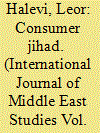

|
|
|
|
|
| Publication |
2012.
|
| Summary/Abstract |
This article deals with the origins, development, and popularity of boycott fatwas. Born of the marriage of Islamic politics and Islamic economics in an age of digital communications, these fatwas targeted American, Israeli, and Danish commodities between 2000 and 2006. Muftis representing both mainstream and, surprisingly, radical tendencies argued that jihad can be accomplished through nonviolent consumer boycotts. Their argument marks a significant development in the history of jihad doctrine because boycotts, construed as jihadi acts, do not belong to the commonplace categories of jihad as a "military" or a "spiritual" struggle. The article also demonstrates that boycott fatwas emerged, to a large degree, from below. New media, in particular interconnected computer networks, made it easier for laypersons to drive the juridical discourse. They did so before September 11 as well as, more insistently, afterward. Their consumer jihad had some economic impact on targeted multinationals, and it provoked corporate reactions.
|
|
|
|
|
|
|
|
|
|
|
|
|
|
|
|
| 2 |
ID:
107644
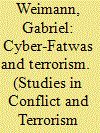

|
|
|
|
|
| Publication |
2011.
|
| Summary/Abstract |
In 1989, the term fatwa became globally known, following Ayatollah Khomeini's death-fatwa issued on Salman Rushdie for his novel, Satanic Verses. Today, the Internet has become a useful platform for posting of fatwas and interpretations of fatwas. The present article highlights the use of jihadist fatwas, and especially online fatwas, as a major instrument in bridging the current wave of terrorism and religion. The analysis, based on a database collected in a 12-year-long project of monitoring thousands of terrorist websites, illustrates how cyber-fatwas are related to key issues in promoting terrorism: justifying the use of suicide terrorism, the killing of innocents, the killing of children and women, the killing of Muslims or the use of various weapons (including weapons of mass destruction and cyberterrorism). There are two implications of the trends documented in this study: First, the analysis of the online fatwas and the fatwa wars may provide insight about the terrorists, their motivations, their doubts and fears and, secondly, it may guide countercampaigns.
|
|
|
|
|
|
|
|
|
|
|
|
|
|
|
|
| 3 |
ID:
177692
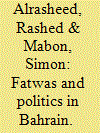

|
|
|
|
|
| Summary/Abstract |
Religious discourse has a fundamental impact on sectarian violence, stability and sovereignty across the Gulf region. Amidst an increasingly volatile political and social situation, fatwas serve as a prominent factor in the behaviour and beliefs of individuals and groups across the Gulf. Fatwas have long been a source of great interest in religious studies and international law yet very little work has been undertaken in politics. This article aims to analyse the impact of fatwas from Shiʿi and Sunni clerics in the promotion of sectarian violence across Bahrain in the aftermath of the Arab Uprisings. In this article, it will be argued that religious discourse has a significant impact in determining the nature of the political relationship between the components of society in Bahrain. We argue that fatwas serve a key role in regulating life across the island and, in the aftermath of the 2011 uprisings, in facilitating sectarian violence.
|
|
|
|
|
|
|
|
|
|
|
|
|
|
|
|
| 4 |
ID:
095481
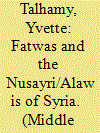

|
|
|
|
|
| Publication |
2010.
|
| Summary/Abstract |
There were five fatwas prior to the twentieth century which were issued by Sunni scholars. Some of these fatwas were specifically against the Nusayris/Alawis while others were against all the extreme Shi'ite creeds including the Nusayris. The first three fatwas were issued during the fourteenth century, during the period of Mamluk rule. They were issued by Shaykh al-Islam Taqi al-Din ibn Taymiyya, and were specifically directed against the Nusayris. The fourth fatwa was issued during the first years of the Ottoman rule over the region of Syria and was against all the extreme Shi'ite creeds. The fifth and last fatwa was issued by a local Shaykh of Latakia specifically against the Nusayris. Those fatwas viewed the Nusayris as heretics outside Islam. During the twentieth century, after the collapse of the Ottoman Empire, the region witnessed the ascendance of 'Pan Arabism', and it was during this period that the Nusayris, known now as Alawis, received a fatwa from the prominent Sunni mufti Hajj Amin al-Husayni recognizing them as part of the Muslim community, which helped them integrate into the Arab world and in Syria. In 1970, the Alawis, under the leadership of the Alawi Hafiz al-Asad, became the rulers of Syria. During the 1970s the Alawis were granted two additional fatwas, this time from prominent Shi'ite scholars recognizing them as part of the Shi'ite creed. All these fatwas had an enormous effect on shaping the history of the Nusayris.
|
|
|
|
|
|
|
|
|
|
|
|
|
|
|
|
| 5 |
ID:
124274
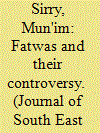

|
|
|
|
|
| Publication |
2013.
|
| Summary/Abstract |
This article discusses a different side of two controversial fatwas - one against Muslims participating in Christmas celebrations and the other against pluralism, liberalism and secularism - issued by the Majelis Ulama Indonesia (MUI, Council of Indonesian Ulama). Most studies on MUI have emphasised the role that the Council's fatwas have played in inciting sectarian violence in Indonesia. Without denying the connections between violence and the MUI fatwas, this article argues that these controversial fatwas have also opened up room for more fruitful and constructive discussions among different religious groups in Indonesia. This article asks: What were the roots of the controversy over these intolerant fatwas? How did the state respond to them? And what does the controversy over these fatwas tell us about the nature of public debate on Islam in Indonesia? By answering these questions this article will shed light on aspects of contemporary Indonesian public debates about Islam that have been overlooked in current scholarship
|
|
|
|
|
|
|
|
|
|
|
|
|
|
|
|
| 6 |
ID:
050434
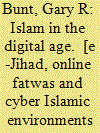

|
|
|
|
|
| Publication |
London, Pluto Press, 2003.
|
| Description |
viii, 237p.
|
| Standard Number |
9780745320984
|
|
|
|
|
|
|
|
|
|
|
|
Copies: C:1/I:0,R:0,Q:0
Circulation
| Accession# | Call# | Current Location | Status | Policy | Location |
| 047588 | 297.0285/BUN 047588 | Main | On Shelf | General | |
|
|
|
|
| 7 |
ID:
120053
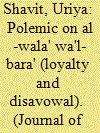

|
|
|
|
|
|
|
|